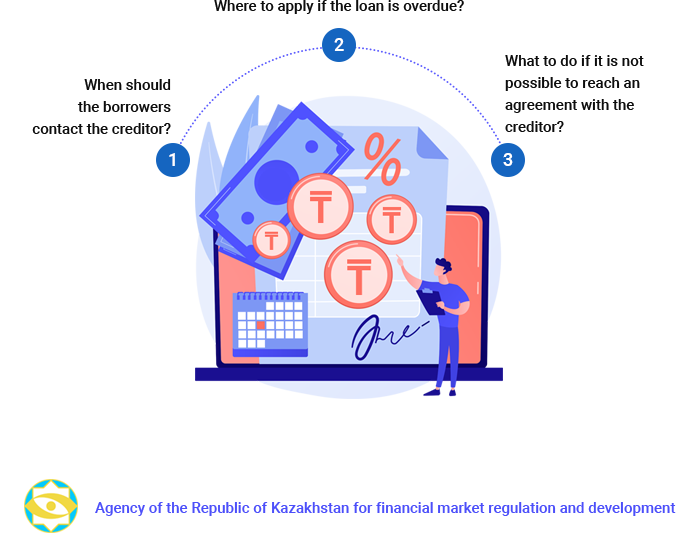What to do if there is a loan overdue?
Введение
Getting a loan is easier than paying it off. Therefore, you need to think carefully before going to the bank for borrowed money. Take a break: you need to clearly assess your financial situation.
Make a detailed financial plan to make accurate projections of your income and expenses. It is required to take into account not only personal salary, premiums, benefits, but also additional income, savings for the case of being unemployed due to disability, for example, or other force majeure. An option suitable for those who keep everything under control is to be insured against disability and job loss.
Keep in mind that a loan is, ultimately, an obligation that you may need to fulfill for a long time. You should not draw it up just for the sake of paying off the current one, especially if the conditions for it do not differ much from the “old” one.
If the decision to apply for a loan has been made, then take your time signing a loan agreement. It is very important to carefully read all its points. Pay special attention to the term of the loan/microcredit; type of remuneration rate: fixed or floating; annual effective interest rate; monthly payment amount and repayment method; information about liability and possible risks of the borrower in the case of non-fulfillment of obligations under the loan agreement.
The source of information is a training site Fingramota.kz implemented by the Agency of the Republic of Kazakhstan for Regulation and Development of the Financial market in order to increase financial literacy of the population.
When should the borrowers contact the creditor?
The natural persons borrowers with overdue debts can resolve the issue of restructuring their loans or microloans directly with the creditors who are obliged to consider the citizens' applications under the law.
Since October 1, 2021, a unified legal regime has been introduced for the settlement by credit organizations (bank or microfinance organization) of problem debts of borrowers – individuals. In accordance with this regime, lenders are required to notify the borrower of the delay within 10 calendar days from the date of its occurrence.
In the notice, the creditors should also inform the citizens about the need to make payments, indicating the exact amount of the delay that has occurred, inform about their right to apply to the bank or MFO and the consequences of failing to fulfill their obligations under the loans and microloans.
Where to apply if the loan is overdue?
If the borrower has overdue debt on the loan, he must, within 30 calendar days from the date of the delay, apply to the financial institution in which he is serviced to restructure the loan with a written application.
In the application, the borrower must specify:
- the reason for non-fulfillment of obligations (it is important to have documents in hand that confirm the deterioration of the financial situation)
- your options for fulfilling obligations. The borrower can offer the lender, for example: a change in the direction of reducing the interest rate, deferral of payment, change in the term of the contract, change in the currency of the loan, repayment method, forgiveness of overdue principal debt and remuneration, cancellation of penalties (fines, penalties), creation of a new payment schedule taking into account their financial situation or independent sale of collateral.
After that, the financial institution will consider the borrower's proposals within 15 days and respond in writing. The lender may agree with your proposals, consider alternative options or refuse.
What to do if it is not possible to reach an agreement with the creditor?
If the consumer has not been able to reach an agreement with the lender, he has the right to contact the banking or microfinance ombudsman with simultaneous notification to the lender.
Upon request concerning changes in the terms of fulfillment of obligations under bank loans and micro-loans, the Ombudsman undertakes to participate in making a mutually acceptable decision and making an agreed decision by the parties on changing the terms of fulfillment of obligations.
Ombudsmen consider applications from borrowers when providing evidence of their application to a bank or microfinance institution and when making a mutually acceptable decision with the lender to change the terms of the agreement.
Consideration of appeals by the Ombudsman for individuals is free of charge.
The Banking Ombudsman is located at 124 Aimanova St., office 301, Almaty, phone: +7 (727) 983-30-16, +7 (708) 983-30-16; e-mail: office@bank-ombudsman.kz .
The Microfinance Ombudsman is located at 53 Mynbayeva St., office 320, Almaty, phone: +7 (727) 338 22 44, +7 (727) 338 22 25; e-mail: info@mfombudsman.kz
How should second-tier banks inform the borrower about the loan overdue?
The banks and MFIs (microfinance organizations) are required to notify the borrower of the delay within 10 calendar days from the date of its occurrence.
In the notice, lenders must also inform the citizens about the need to make payments, indicating the exact overdue amount, inform about their right to apply to them and the consequences of failing to fulfill their obligations under the loans and microloans.
